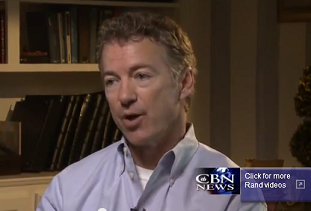Sen. Rand Paul Discourages Evangelical Warmongering, Suggests Federalism Can Stop Spread of Gay Marriage

Kentucky Sen. Rand Paul got some divergent attention over the weekend following an interview with the Christian Broadcasting Network about his political and religious beliefs.
Asked about his position on gay marriage recognition, his comments were a bit different (though not really contradictory) from what he said in a recent National Review interview, where he said he would not object to changes to the tax code so that it doesn't mention marriage.
Interviewed by David Brody, he states:
I think that we've got a long history with marriage. I'm not kind of willing to give up on it yet. The family unit, even above and beyond America and before America – the family unit is something that has come about for thousands of years – we've had a family structure and I think it's an important structure. And not everybody in the country is going to agree with me on that. … Young people seem to be changing their opinions. I think we should still be in favor of what we're in favor of, and that is that there is a traditional family unit and that it's important.
The law is gonna be somewhat different, in the sense that we've always had marriage certificates at the state level. If we keep it that way we can still have the discussion go on without making the decision go all the way one way or all the way the other way. I think right now if we say we're only going to [have] a federally mandated one man, one woman marriage, we're going to lose that battle because the country is going the other way right now. If we're to say each state can decide, I think a good 25, 30 states still do believe in traditional marriage, and maybe we allow that debate to go on for another couple of decades and see if we can still win back the hearts and minds of people."
I hadn't yet heard federalism actually invoked before as a way of keeping the gay marriage recognition fight going (though obviously state voters have been using it to block recognition for the past decade). I'm curious as to whether he actually thinks polls are going to suddenly reverse themselves on gay marriage in a few years. Why would that actually happen? His comments strike me as a man trying to have it both ways. It feels like he's trying to throw a bone to social conservatives without making any sort of policy commitments. It's also a bit disconcerting to hear a libertarian-leaning conservative recommending the use of the democratic process to restrict liberty. The quote might be problematic in some quarters, and not just among the anti-federalist left.
Paul also got some attention for criticizing some evangelical Christians for being too quick to quick to support military action:
I think when we talk about war, I think Part of Republicans' problems and, frankly, to tell you the truth, some in the evangelical Christian movement, I think have appeared too eager for war. When people come to me and they're lobbying for ratcheting up some bellicose policy – even if it's toward a bad country — I tell them: "When I read the New Testament, and when I read about Jesus, he wasn't really involved in the war of his days." In fact, people rebuked him for not being the king they wanted; they wanted somebody to stand up to the Romans. He stood up in a different sort of way. … We're talking about, blessed are the peacemakers, not blessed are the warmakers.
You can watch the full 22-minute interview with Paul (and his wife) below. He also talks about the freedom to make bad choices and quotes Frederic Bastiat:


Show Comments (273)